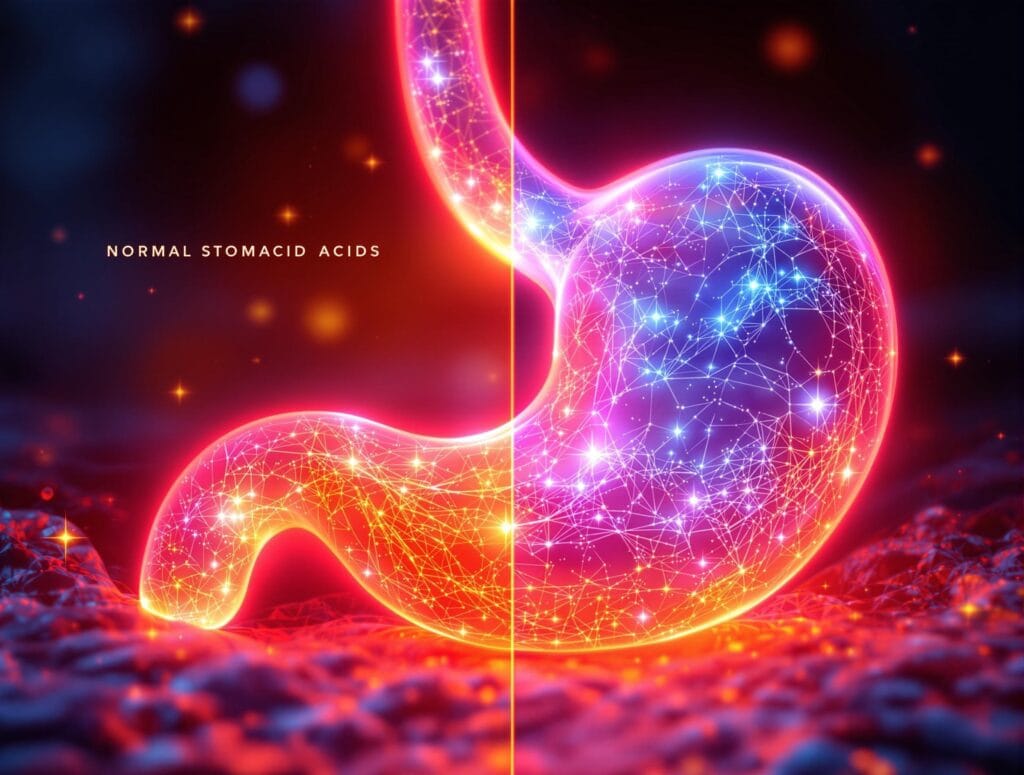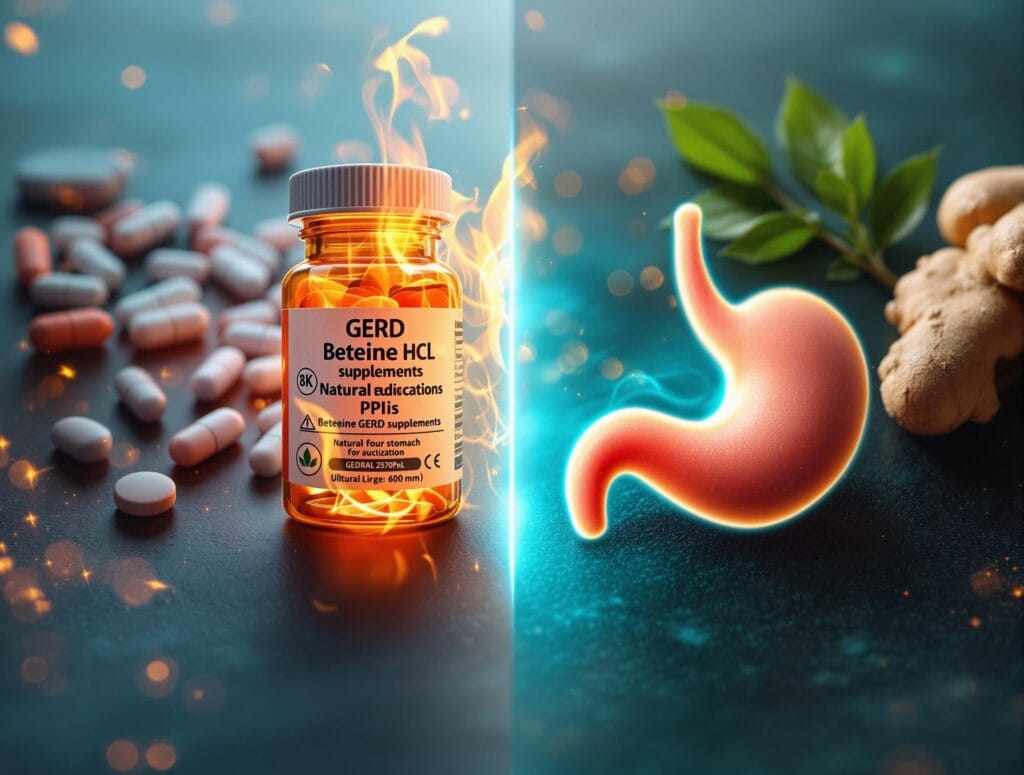1️⃣ Introduction: The Truth About GERD & Stomach Acid
Do you often experience burning sensations in your chest, bloating after meals, or constant acid reflux? If so, you might have GERD (Gastroesophageal Reflux Disease)—a condition that affects millions of people worldwide.
For years, we’ve been told that GERD is caused by excess stomach acid, leading many to rely on antacids and proton pump inhibitors (PPIs) to find relief. But what if we told you that this common belief is a myth?
Here’s the surprising truth: Most GERD cases are caused by low stomach acid, not too much acid. In fact, when your stomach lacks sufficient acid (a condition called hypochlorhydria), it struggles to break down food properly, leading to poor digestion, acid reflux, and long-term gut health problems.
But don’t worry—there are natural, science-backed ways to restore stomach acid balance and treat GERD without harmful medications. In this guide, we’ll explore the real cause of GERD, the dangers of conventional treatments, and effective strategies to heal your gut naturally.
Let’s dive in and take control of your digestive health.
2️⃣ Understanding GERD and Its True Causes
GERD (Gastroesophageal Reflux Disease) is often misunderstood. Most people believe it occurs because their stomach is producing too much acid, but the real culprit is often low stomach acid (hypochlorhydria).
When stomach acid levels are too low, the lower esophageal sphincter (LES) — the valve that prevents stomach contents from flowing back up into the esophagus — fails to close properly. This allows even small amounts of stomach acid to escape, leading to heartburn, acid reflux, bloating, and indigestion.

The Myth of Too Much Stomach Acid
Many GERD sufferers turn to antacids and proton pump inhibitors (PPIs), believing that reducing stomach acid is the solution. However, research shows that low stomach acid is a much more common problem—especially in older adults.
A study found that nearly 30% of people over 60 suffer from stomach acid deficiency, which affects their ability to digest food, absorb nutrients, and maintain gut health. Yet, many of these individuals are prescribed acid-suppressing medications, which exacerbate the problem rather than fix it.
Symptoms of Low Stomach Acid (Hypochlorhydria)
If you have GERD but PPIs or antacids don’t seem to help long-term, you may actually have low stomach acid. Here are some key symptoms:
- Bloating and indigestion after meals
- Burping or feeling full too quickly
- Acid reflux, especially after eating protein-rich foods
- Nutrient deficiencies (B12, iron, zinc, and magnesium)
- Frequent bacterial infections or small intestine bacterial overgrowth (SIBO)
Understanding that GERD is not caused by excess acid but by insufficient acid production is a critical first step in finding the right treatment. Instead of relying on acid-suppressing medications, it’s time to explore natural ways to restore stomach acid balance and heal GERD from its root cause.
3️⃣ The Science Behind Stomach Acid Balance
Stomach acid plays a crucial role in digestion, nutrient absorption, and microbial defense. Without adequate levels of hydrochloric acid (HCl), the entire digestive system suffers—leading to GERD, bloating, poor gut health, and even chronic inflammation.
But what exactly does stomach acid do, and why is it so important? Let’s break it down.
How Stomach Acid Supports Digestion
Your stomach is designed to maintain a highly acidic environment, with a pH level between 1 and 3. This acidity is essential for:
✔️ Breaking down proteins into amino acids for absorption
✔️ Activating digestive enzymes, such as pepsin, to aid digestion
✔️ Stimulating bile release from the gallbladder for fat digestion
✔️ Triggering pancreatic enzymes to break down carbohydrates, proteins, and fats
✔️ Killing harmful bacteria and pathogens before they reach the intestines
When stomach acid levels are too low, digestion slows down, food sits in the stomach longer, fermentation occurs, and gas builds up, creating pressure on the lower esophageal sphincter (LES). This pressure forces acid to escape into the esophagus, causing heartburn and acid reflux—even if the stomach isn’t producing enough acid in the first place.
Why Stomach pH Matters for Gut Health
A properly acidic stomach is vital for absorbing key nutrients like:
🔹 Vitamin B12 – Needed for energy and brain function
🔹 Iron – Essential for red blood cell production
🔹 Zinc – Crucial for immune health and stomach lining repair
🔹 Magnesium – Supports muscle function and relaxation
Without enough acid, nutrient absorption declines, leading to deficiencies that can worsen GERD symptoms and overall health.
The Connection Between Stress and Stomach Acid
Your digestive system is controlled by the autonomic nervous system (ANS), which has two branches:
- The Sympathetic Nervous System (Fight-or-Flight) → Suppresses digestion
- The Parasympathetic Nervous System (Rest-and-Digest) → Stimulates acid production
When you’re constantly stressed, anxious, or in a high-alert state, the sympathetic nervous system takes over, shutting down stomach acid production. This is why stress is a major trigger for GERD, bloating, and digestive discomfort.
To restore stomach acid levels, you must:
✅ Support digestion with the right nutrients (like zinc and betaine HCl)
✅ Maintain a proper stomach pH for enzyme activation
✅ Manage stress and activate the parasympathetic nervous system
Now that we understand why stomach acid balance is so crucial, let’s explore why conventional GERD medications often make the problem worse.
4️⃣ The Dangers of Conventional GERD Medications
For decades, proton pump inhibitors (PPIs) and antacids have been the go-to treatment for GERD. These medications are designed to reduce stomach acid, but what if that’s exactly the problem?
If low stomach acid is a leading cause of GERD, then suppressing acid further may provide temporary relief but worsen the condition over time. Let’s take a closer look at the risks associated with these medications.
How PPIs Work – And Why They’re Problematic
PPIs, such as omeprazole, lansoprazole, and esomeprazole, work by blocking stomach acid production at the source. This may seem like a logical solution, but it disrupts essential digestive functions and can lead to long-term complications, including:
1️⃣ Nutrient Deficiencies – Reduced acid leads to poor absorption of B12, magnesium, calcium, and iron, increasing the risk of anemia, osteoporosis, and muscle weakness.
2️⃣ Increased Risk of Infections – Stomach acid acts as a natural defense against harmful bacteria like H. pylori and C. difficile. Long-term PPI use makes the gut more susceptible to bacterial overgrowth and infections.
3️⃣ Kidney and Liver Damage – Studies show that prolonged PPI use can contribute to chronic kidney disease (CKD) and liver inflammation.
4️⃣ Rebound Acid Hypersecretion – When people stop taking PPIs, their acid production rebounds higher than before, making symptoms worse than ever.
The Truth About Calcium Supplements and GERD
Many people take calcium carbonate (TUMS) as an antacid, believing it neutralizes acid effectively. While it may offer temporary relief, it can actually worsen GERD in the long run.
Excessive calcium can:
❌ Interfere with stomach acid production, making digestion harder
❌ Lead to hypercalcemia, which may weaken the LES valve
❌ Reduce zinc absorption, which is crucial for stomach acid production
If you’ve been relying on PPIs or antacids for GERD relief, it may be time to reconsider. Instead of suppressing acid, the goal should be to restore stomach acid balance naturally.
Next, let’s explore science-backed strategies to heal GERD without medication.
5️⃣ How to Treat GERD Naturally: Science-Backed Solutions
Now that we understand that low stomach acid is the real cause of GERD, let’s focus on how to fix it naturally. Unlike conventional treatments that suppress symptoms, these science-backed strategies restore stomach acid balance, improving digestion and eliminating acid reflux at its root cause.

1. Betaine Hydrochloride: The Best Supplement for Stomach Acid Balance
One of the most effective ways to restore stomach acid is by taking Betaine HCl (Hydrochloric Acid). This supplement mimics natural stomach acid and helps to:
✔️ Close the lower esophageal sphincter (LES) valve, preventing acid reflux
✔️ Improve protein digestion and nutrient absorption
✔️ Reduce bloating, indigestion, and post-meal discomfort
How to Take Betaine HCl for GERD Relief:
- Start with one capsule before a meal and assess how you feel.
- Gradually increase the dosage until you feel slight warmth in your stomach.
- Once you reach this point, reduce the dosage slightly and continue.
Most people with severe stomach acid deficiency need around 5-7 capsules per meal before their acid levels are restored.
2. Essential Minerals: Zinc, Potassium, and Sea Salt for Acid Production
Your stomach needs key minerals to produce hydrochloric acid. Deficiencies in zinc, potassium, and chloride (from salt) can weaken digestion and worsen GERD.
✔️ Zinc – Stimulates acid production and repairs the stomach lining
✔️ Potassium – Helps regulate stomach pH and prevent acid reflux
✔️ Sea Salt (Sodium Chloride) – Provides chloride ions for stomach acid production
💡 Best Food Sources:
- Zinc → Pumpkin seeds, oysters, beef, chickpeas
- Potassium → Bananas, avocados, leafy greens
- Sea Salt → Use natural sea salt instead of processed table salt
3. Chewing Food Properly: A Simple But Powerful Digestive Hack
Most people eat too fast and swallow food without fully chewing it, putting extra stress on the stomach. When you chew food properly, you:
✔️ Break down food into smaller particles, making digestion easier
✔️ Stimulate saliva enzymes, which start the digestive process
✔️ Reduce bloating and indigestion, preventing acid reflux triggers
Pro Tip: Try chewing each bite at least 20-30 times before swallowing to optimize digestion.
4. Reducing Stress to Activate the Parasympathetic Nervous System
Chronic stress shuts down digestion by activating the sympathetic nervous system (fight-or-flight mode). To produce stomach acid efficiently, your body needs to be in a parasympathetic (rest-and-digest) state.
✔️ Practice deep breathing before meals to relax your digestive system.
✔️ Eat in a calm, distraction-free environment to enhance digestion.
✔️ Try meditation, yoga, or light exercise to reduce stress hormones.
By addressing stomach acid deficiencies with proper supplementation, essential minerals, mindful eating, and stress management, you can reverse GERD naturally and restore digestive health.
Next, let’s explore how diet plays a crucial role in GERD treatment.
6️⃣ The Role of Diet in GERD Treatment
Your diet plays a crucial role in managing GERD naturally. The right foods can support stomach acid production, while the wrong ones can trigger acid reflux and worsen symptoms. Let’s break down the best and worst dietary choices for GERD relief.
Best Foods to Restore Stomach Acid Naturally
Certain foods can help your body produce more stomach acid, strengthen digestion, and prevent GERD flare-ups.
✅ Top Acid-Supporting Foods for GERD Relief
✔️ Fermented Foods → Sauerkraut, kimchi, kefir (stimulate digestion & good bacteria)
✔️ Apple Cider Vinegar (ACV) → Helps acidify the stomach (1 tbsp in water before meals)
✔️ Bitter Greens → Arugula, dandelion greens, kale (stimulate stomach acid secretion)
✔️ Lean Proteins → Chicken, turkey, fish (easier to digest compared to red meat)
✔️ Healthy Fats → Avocados, olive oil, coconut oil (support gut lining & digestion)
✔️ Bone Broth → Rich in gelatin & amino acids that heal the gut lining
Eating more of these foods can gradually help restore acid balance and improve digestion.
Worst Foods That Trigger Acid Reflux and GERD
Some foods can weaken the lower esophageal sphincter (LES) and increase stomach pressure, leading to acid reflux symptoms.
❌ Foods That Make GERD Worse
❌ Processed Foods & Refined Sugars → Cause inflammation & disrupt gut bacteria
❌ Caffeine & Carbonated Drinks → Relax the LES, leading to acid reflux
❌ Spicy Foods → Can irritate the esophagus if the stomach lining is weak
❌ Fried & Fatty Foods → Slow digestion, increasing acid reflux risk
❌ Alcohol → Weakens the LES and increases stomach acid secretion at the wrong time
Pro Tip: Keep a food journal to track which foods trigger your GERD symptoms and adjust accordingly.
Why Fiber and Probiotics May Not Always Help GERD
Many people believe that fiber and probiotics are always good for digestion, but if you have low stomach acid, they can actually cause bloating and discomfort.
✔️ Too much fiber too fast can lead to fermentation in the gut, causing gas and bloating.
✔️ Probiotics without enough stomach acid can lead to bacterial overgrowth (SIBO), worsening GERD symptoms.
Instead of relying on fiber and probiotics alone, focus first on restoring stomach acid balance, then introduce them gradually.
By making these simple dietary adjustments, you can support healthy digestion, reduce GERD symptoms, and restore proper acid balance naturally.
Next, let’s explore how gut health and bacterial balance impact GERD.
7️⃣ Addressing Underlying Causes: Gut Health & Bacteria Balance
GERD isn’t just about stomach acid levels—your gut bacteria and digestive enzymes also play a major role. If you’ve been struggling with chronic acid reflux, bloating, or indigestion, it’s time to look deeper into gut health imbalances that could be making things worse.
H. Pylori Overgrowth and Its Link to GERD
H. pylori (Helicobacter pylori) is a common bacterium that lives in the stomach. While it’s usually harmless, low stomach acid levels allow it to overgrow, leading to chronic inflammation, ulcers, and GERD symptoms.
🔹 Symptoms of H. pylori overgrowth:
✔️ Persistent acid reflux or heartburn
✔️ Nausea, bloating, and belching
✔️ Feeling full after small meals
✔️ Unexplained weight loss or loss of appetite
🔹 How to Naturally Reduce H. pylori Overgrowth:
✔️ Restore stomach acid with Betaine HCl (H. pylori thrives in low-acid environments)
✔️ Eat antibacterial foods like garlic, ginger, and oregano oil
✔️ Limit sugar intake, which fuels bacterial growth
SIBO (Small Intestine Bacterial Overgrowth) and GERD
SIBO occurs when bacteria that should stay in the large intestine overgrow in the small intestine, causing bloating, gas, and acid reflux.
🔹 Signs of SIBO in GERD Sufferers:
✔️ Bloating and fullness after meals
✔️ Acid reflux that worsens with probiotics or fiber
✔️ Constipation or diarrhea cycles
✔️ Strong cravings for sugar and carbs
🔹 How to Treat SIBO Naturally:
✔️ Reduce fermentable carbohydrates (avoid high-fiber and high-sugar foods)
✔️ Support stomach acid levels (bacteria thrive in low-acid environments)
✔️ Consider herbal antimicrobials like berberine and oregano oil

The Importance of Bile Flow and Pancreatic Enzymes
Your gallbladder and pancreas play an essential role in digesting fats and proteins. Without enough stomach acid, bile and digestive enzymes are not properly released, leading to poor digestion and acid reflux.
✔️ Bile helps break down fats and prevents reflux into the stomach.
✔️ Pancreatic enzymes aid in protein digestion, reducing the risk of bloating and indigestion.
How to Improve Bile Flow and Enzyme Production:
✔️ Eat bitter foods like dandelion greens and lemon water to stimulate bile flow.
✔️ Take ox bile or digestive enzyme supplements if you experience bloating after fatty meals.
✔️ Consume healthy fats like olive oil, coconut oil, and avocados to support bile production.
By addressing gut bacteria imbalances, improving bile flow, and restoring proper digestion, you can eliminate acid reflux at its root cause—without relying on harmful medications.
Next, let’s look at practical tips for maintaining long-term GERD relief.
8️⃣ Practical Tips for Long-Term GERD Relief
Now that we’ve covered the root causes of GERD and how to restore stomach acid naturally, let’s focus on long-term strategies to maintain digestive health and prevent acid reflux from returning.
1. Monitor Your Symptoms and Adjust Your Approach
GERD recovery isn’t one-size-fits-all—it requires careful observation of what works best for your body. Keep a symptom tracker to note:
✔️ Which foods trigger your acid reflux?
✔️ How does your digestion feel after meals?
✔️ How do Betaine HCl and other supplements affect you?
✔️ Are stress levels impacting your digestion?
This personalized approach allows you to make targeted adjustments instead of guessing.
2. Creating a Long-Term GERD Management Plan
To prevent GERD from returning, follow these key habits:
✅ Stay consistent with Betaine HCl until your stomach acid levels normalize.
✅ Eat mindfully and chew thoroughly to improve digestion.
✅ Avoid overconsumption of processed foods, sugar, and alcohol.
✅ Support gut health with prebiotic-rich foods (onions, garlic, leeks) once digestion is stable.
✅ Manage stress through daily relaxation techniques (breathing exercises, meditation, or yoga).
3. How to Tell If Your Stomach Acid Levels Are Improving
How do you know if your natural GERD treatment is working? Look for these signs:
✔️ No more acid reflux or bloating after meals
✔️ Improved digestion and regular bowel movements
✔️ Better nutrient absorption and increased energy
✔️ No longer feeling “full” after small meals
✔️ Less dependence on medications or antacids
Bonus Tip: The Baking Soda Stomach Acid Test
A simple way to test your stomach acid levels at home is the baking soda test:
1️⃣ Mix 1/4 tsp of baking soda in a glass of water.
2️⃣ Drink it first thing in the morning before eating.
3️⃣ If you burp within 3-5 minutes, your stomach acid is likely sufficient.
4️⃣ If you don’t burp, you may have low stomach acid and need to continue treatment.
By staying consistent with dietary changes, supplementation, and stress management, you can reverse GERD naturally and maintain lifelong digestive health.
Next, let’s wrap up everything with a final conclusion and key takeaways.
9️⃣ Conclusion: Take Control of Your Digestive Health
GERD doesn’t have to be a lifelong struggle. By understanding that low stomach acid—not too much acid—is the real cause, you can take control of your digestive health and eliminate acid reflux naturally.

Key Takeaways from This Guide:
✔️ GERD is often caused by low stomach acid (hypochlorhydria), not excess acid.
✔️ PPIs and antacids may provide temporary relief but can worsen the condition long-term.
✔️ Restoring stomach acid levels with Betaine HCl, zinc, potassium, and sea salt is crucial.
✔️ A diet rich in fermented foods, lean proteins, and bitter greens supports digestion.
✔️ Managing stress and practicing mindful eating helps regulate stomach acid production.
✔️ Addressing gut imbalances like H. pylori overgrowth and SIBO can prevent chronic GERD symptoms.
By applying these science-backed strategies, you can heal your digestive system, absorb essential nutrients, and live free from acid reflux—without harmful medications.
Are you ready to take charge of your gut health? Start today by making one small change—whether it’s chewing your food more, reducing stress before meals, or adding Betaine HCl to your routine.
📌 FAQ Section (Common GERD Questions Answered)
1. Can you really fix GERD naturally without medication?
Yes! By restoring stomach acid levels, eating gut-friendly foods, and reducing stress, you can eliminate GERD symptoms naturally.
2. How long does it take to restore stomach acid levels?
It varies per person. Some notice improvements within a few weeks, while others may take a few months to rebuild proper stomach acid levels.
3. Is Betaine HCl safe for long-term use?
Yes, when taken correctly. Start with a low dose and gradually increase based on symptoms. Once digestion improves, most people can reduce or stop supplementation.
4. What are the best supplements for GERD?
✔️ Betaine HCl (restores stomach acid)
✔️ Zinc (supports stomach lining and acid production)
✔️ Digestive enzymes (aid digestion)
✔️ Probiotics (after stomach acid is restored)
5. How does stress impact acid reflux?
Stress activates the sympathetic nervous system (fight-or-flight mode), shutting down digestion and reducing stomach acid. Managing stress helps regulate acid production and improve digestion.
6. Should I avoid all acidic foods if I have GERD?
No! Many acidic foods, like apple cider vinegar and fermented foods, actually help restore stomach acid balance and improve digestion.
7. Can GERD be permanently cured?
Yes! By addressing low stomach acid, gut imbalances, and lifestyle factors, many people completely reverse GERD and live symptom-free.


























